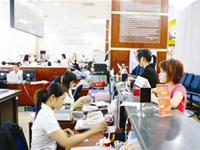
| Non-dollar currencies revaluating, is it time to invest in currencies? | |
The fact that the Japanese yen has been appreciating against other currencies, like the greenback, euro and VND, has prompted people to keep non-dollar hard currencies, with a hope that the currencies will revalue, like they did in mid-2008. The fever will not re-occur In mid-2008, when concerns about the The AUD once hit VND 18,500/AUD $1.00, while the CAD once hit VND 18,000/CAD $1.00, as the highest peaks. Meanwhile, on December 9, the exchange rates were reportedly at VND 11,300/AUD $1.00, VND 13,700/CAD $1.00, while one dollar was converted to VND 17,000. As such, within the last half year, an AUD dropped by over VND 7,000, while a CAD dropped by VND 4,000, both of which are sharp devaluations that experts say very rarely occur with any hard currency. Dinh The Hien, a financial expert, said that the AUD, CAD, and the euro increased for some time because of the insecurity of buyers, while the high prices of the currencies did not truly reflect the real values of the currencies. Analysts said that not everyone can earn big money in the ‘non-dollar foreign currencies fever’ in 2008. A lot of people even incurred heavy losses when the AUD, CAD and euro values decreased sharply after they increased. Keeping JPY? Not advisable JPY has been appreciating rapidly against the VND, from VND 130-140/JPY to the current exchange of VND 180/JPY, which has brought high hopes of earning money to many investors. The yen revaluation has been so rapid and sharp that it has made a lot of businesses miserable. General Director of Pha Lai Thermopower Company, Nguyen Khac Son, a company that borrowed loans in JPY, said that every year, the company looses VND 60 billion due to the JPY appreciation. However, keeping JPY is still not advisable for investors. Forex trading director of a bank said that even the Government of Japan does not want the JPY to increase in value at this moment, warning that those who plan to keep the currency should be cautious with their decision. Dr. Nguyen Quang Hung also said that it is not only Non-dollar deposits? Not advisable Some investors may think that it would be less risky to keep currencies whose values are on the rise. In the worst case, they can still make deposits at banks for interest. However, making deposits in non-dollar currencies is also not advisable, as deposits in foreign currencies bring very low interest rates. Eximbank, on December 9, showed the following interest rates: 9% per annum for VND 2-month term deposit, 4.6% per annum for USD deposit, AUD 2.5%, CAD 1.6%, and JPY 0.8%. In fact, not many people want to keep foreign currencies other than the dollar. Dam The Thai, Director in charge of individual clients under ABBank, said that most clients make deposits in USD and euro only, while very few clients make deposits in other currencies. On the black market, clients always have to bear higher charges to convert non-dollar currencies into VND. Le Tri Thong, Deputy General Director of East Asia Bank, also said that clients do not like receiving overseas remittance in non-dollar currencies, while they always ask for either VND or USD. | |
| Tien phong |
